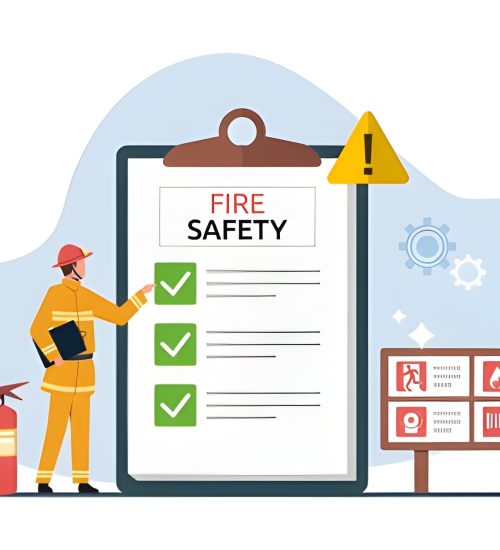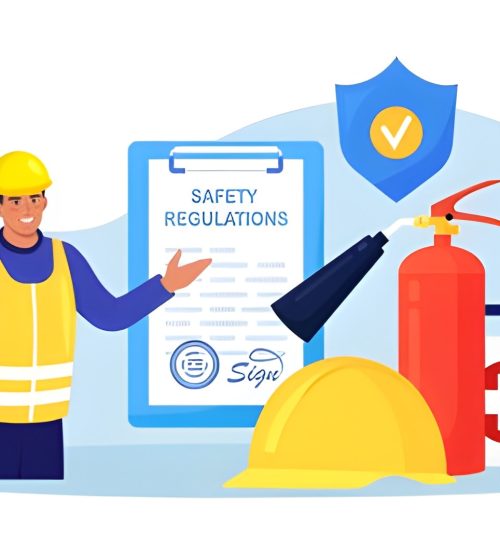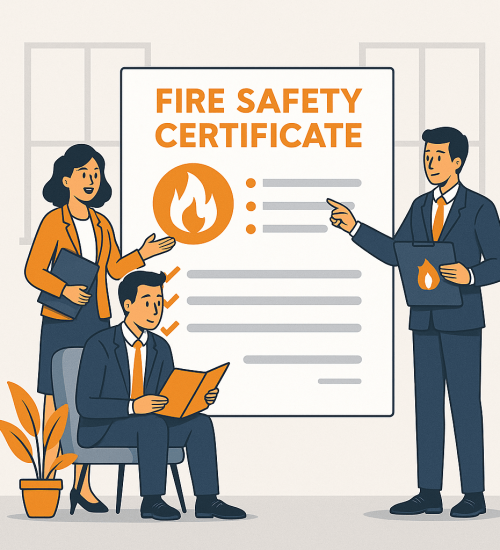Fire Safety Certificate for Landlords | Certified & Compliant Solutions
Get Best Services Offers On SafehomeLondon
What is a fire safety certificate?
A Fire Safety Certificate confirms that a property has undergone a fire risk assessment by a qualified professional and complies with the Fire Safety Order 2005. This certificate ensures that all fire safety measures, including fire escape plans, alarm systems, and extinguishers, are in place to protect tenants and the property.
Key Features of a Fire Safety Certificate:
- Assessment of Fire Hazards: Identifies ignition sources and potential fire risks.
- Emergency Exits & Escape Routes: Ensures all exits are accessible and clearly marked.
- Fire Alarms & Smoke Detectors: Verifies proper installation and functionality.
- Extinguishers & Fire Equipment: Confirms the availability and condition of fire-fighting tools.
- Official Fire Risk Assessment Report: Provides a detailed document outlining compliance and recommendations.

Why fire safety is crucial for landlords
- 1. Legal requirement
Landlords are legally obligated to ensure fire safety compliance in all rental properties under the Fire Safety Order 2005.
- 2. Prevent fire incidents
Regular assessments help prevent deadly fire outbreaks, saving lives and reducing property damage.
- 3. Tenant confidence
Demonstrates your commitment to tenant safety and well-being, boosting trust and satisfaction.
- 4. Required documentation
A Fire Safety Certificate is essential for:
- Insurance claims.
- Council licensing.
- Legal proof of compliance.



Do you need a fire safety inspection?
A Fire Safety Certificate (also known as a BS 5839 certificate) is issued after a thorough inspection by a qualified fire safety engineer. This inspection ensures that all fire safety equipment, including heat and smoke alarms, is compliant with current fire safety regulations. Certificates are typically valid for one year, after which a new inspection is required.
Why It’s Important:
- Protects you and your tenants from fire-related risks.
- Ensures compliance with fire safety regulations.
- Reduces liability in case of fire-related incidents.

The different types of smoke alarms you can install in your home
- Battery-Powered Alarms
These alarms are powered by replaceable or sealed batteries. They are cost-effective and easy to install, making them ideal for smaller properties or temporary solutions. However, regular battery checks are essential to ensure functionality.
- Mains-Powered Alarms
Connected directly to the property’s electrical system, these alarms often include a battery backup for power outages. They are more reliable and suitable for long-term use in residential and commercial properties.
- Fire Alarm Panel Systems
These systems are designed for larger buildings, such as multi-occupancy properties or commercial spaces. They connect multiple alarms to a central control panel, allowing for efficient monitoring and management of fire safety systems.

Understanding BS 5839 Fire Safety Certificates for Buildings
The BS 5839 standard outlines the design, installation, and maintenance of fire detection and alarm systems in buildings. It ensures that fire safety systems are effective, reliable, and compliant with UK regulations.
Fire Alarm Grades:
- Grade A: Advanced systems with control panels, detectors, and alarms.
- Grade C: Systems with central control but fewer components than Grade A.
- Grade D1: Mains-powered alarms with tamper-proof batteries.
- Grade D2: Mains-powered alarms with replaceable batteries.
- Grade F1: Battery-powered alarms with long-life batteries.
- Grade F2: Basic battery-powered alarms.
Fire Alarm Coverage Levels:
- LD3 (Basic Coverage): Protects escape routes.
- LD2 (Enhanced Coverage): Covers escape routes and high-risk areas.
- LD1 (Maximum Protection): Provides coverage for all areas of the property.

Who can issue a fire safety certificate?
Only qualified fire safety engineers or certified professionals can issue a Fire Safety Certificate. These professionals are trained to assess fire risks, inspect safety equipment, and ensure compliance with BS 5839 and other fire safety regulations.

What happens if I don’t get a fire safety certificate?
Failing to obtain a Fire Safety Certificate can result in:
- Legal Penalties: Non-compliance with fire safety laws can lead to fines or legal action.
- Insurance Issues: Claims may be denied if fire safety compliance cannot be proven.
- Increased Risk: Without regular inspections, fire hazards may go unnoticed, endangering lives and property.

Why Choose Us?
- NICEIC approved contractors
Our team consists of NICEIC-certified professionals with extensive experience in fire safety compliance.
- Next day booking
We offer fast and flexible scheduling, including next-day appointments, to meet your urgent fire safety needs.
- Lowest price guaranteed
Our pricing is transparent and competitive, ensuring you receive the best value without hidden fees.
- What does our fire risk assessment include?
- Inspection of Fire Detection Systems: Verifies the functionality of alarms and detectors.
- Review of Stairwells, Corridors, and Exit Signage: Ensures clear and accessible escape routes.
- Evaluation of Fire Doors and Compartmentalization: Checks for proper fire containment measures.
- Creation of Emergency Evacuation Plans: Develops clear and actionable escape strategies.
- Issuance of a Formal Risk Assessment Report: Provides a detailed document outlining compliance and recommendations.
A Fire Safety Certificate confirms that a property has undergone a fire risk assessment and complies with fire safety regulations.
Certificates are typically valid for one year. Annual inspections are required to renew compliance.
It includes inspecting fire alarms, smoke detectors, extinguishers, emergency exits, and escape routes.
Only qualified fire safety engineers or certified professionals can issue the certificate.
- You may face legal penalties, insurance issues, and increased fire risks.
The type depends on the property size and usage. Options include battery-powered alarms, mains-powered alarms, and fire alarm panel systems.
BS 5839 is the UK standard for fire detection and alarm systems, outlining installation, maintenance, and compliance requirements.
Pricing varies based on property size and complexity. Contact us for a custom quote.
Yes, we offer multi-service packages that include EICR, gas safety, and fire safety inspections.
Contact us via phone, email, or our website to schedule your inspection at a convenient time.
